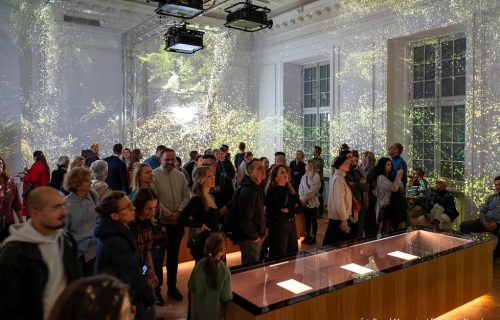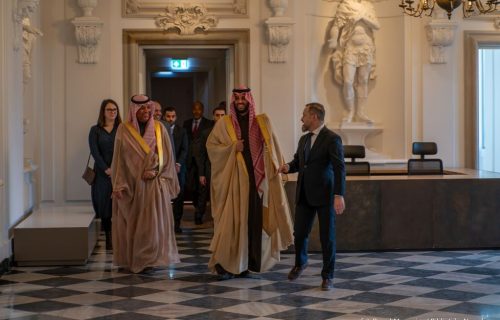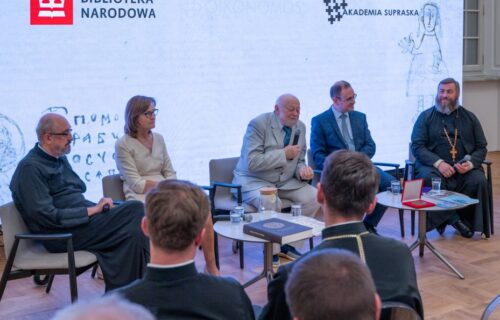Palace of the Commonwealth open to visitors
Tuesday, May 21st saw the grand opening of the Palace of the Republic. The palace, one of the most beautiful in Warsaw, is now open to the public for the first time in its long history, stretching back to the seventeenth century. The grand opening was marked with a gala concert, which included a specially composed piece of music by Tadeusz Woźniak entitled Słowo (The Word), directed by Krzysztof Materna.
The event featured special guest appearances by Joanna Kulig, Jolanta Majchrzak, Justyna Schneider, Daniel Olbrychski, Marcin Przybylski, Olek Różanek, Tadeusz Woźniak, Marek Raduli and his Zespół Rocka Progresywnego (Progressive Rock Band) and the Sinfonia Varsovia led by Wojciech Michniewski. Dr Katarzyna Kasia and Grzegorz Markowski acted as hosts.
Among the many distinguished guests attending the event were the Deputy Speaker of the Senate of the Republic of Poland, Rafał Grupiński, the Minister of Culture and National Heritage, Hanna Wróblewska, and the Ambassador of the Kingdom of Norway, His Excellency Øystein Bø.
Dr Tomasz Makowski, Director General of the National Library of Poland, welcomed the guests as follows:
The Palace of the Commonwealth, closed for hundreds of years, today rejoins the many attractions of our beautiful city that are open to the public. It is now the home of treasures from many nations, cultures, languages and religions which for hundreds of years lived together peacefully, respecting the values and laws of the Commonwealth, which in return provided them with freedom, tolerance and encouragement to develop themselves further. Today I pay tribute to those individuals in the history of our Republic who have made us who we are today, shaping our imagination, the richness and precision of our language, our curiosity about the world, our openness to difference and diversity and our unique vision – outstanding individuals such as Jan Kochanowski, Adam Mickiewicz, Cyprian Kamil Norwid, Juliusz Słowacki, Maria Konopnicka, Eliza Orzeszkowa, Zbigniew Herbert, Czesław Miłosz, Witold Gombrowicz, Frederic Chopin, Mikołaj Górecki, Agnieszka Osiecka and Krzysztof Komeda.
The National Library of Poland, which first opened 277 years ago, has through its efforts built a strong reputation as an institution of public trust. That is why so many people of culture and science leave their legacies to us.
The National Library is a treasury of the written word of the Republic of Poland, of all that is noblest, most beautiful and most important in our history and culture. But most of all it is a treasury of our intellectual heritage as it is today and as it was in the past. As such, it is home to wise books and foolish books, books of which we are proud and books of which we are ashamed.
I am grateful to the many people who have held dear the idea of the National Library of Poland for almost 300 years.
Today the National Library is the largest library in Poland. It also boasts one of Europe’s largest digital libraries, polona.pl, which contains four million items and is continuously growing in collaboration with the best libraries across Poland.
 Minister of Culture and National Heritage, Hanna Wróblewska: Among the many treasures that the Director General mentioned, the many manuscripts and documents, there is another important document in the National Library of Poland. It is not on display, but it is there. It is the Pact for Culture, a pact signed between the government of the Republic of Poland and Polish society over a dozen years ago. This pact continues to bind us, the government and the public. It speaks of the importance of universal access to culture. And it is a priority for this government.
Minister of Culture and National Heritage, Hanna Wróblewska: Among the many treasures that the Director General mentioned, the many manuscripts and documents, there is another important document in the National Library of Poland. It is not on display, but it is there. It is the Pact for Culture, a pact signed between the government of the Republic of Poland and Polish society over a dozen years ago. This pact continues to bind us, the government and the public. It speaks of the importance of universal access to culture. And it is a priority for this government.
I am most grateful for the fact that today we are able to open up the Palace of the Commonwealth, and that universal access to these treasures – our cultural treasures – has become a reality.
 Ambassador of the Kingdom of Norway, Øystein Bø: Literature and literary treasure are part of every nation’s history and soul. That is why the renovation and the opening to the public of the Palace of the Commonwealth is so important. Making all these treasures and manuscripts available to the public is an important contribution to telling the history of Poland. Representing Norway in Poland, I am both proud and pleased that we, through the EEA grants, have had the opportunity to take part in this important work. The EEA and Norway grants are founded on common values, human rights and solidarity aimed at reducing social and economic inequalities in Europe. This year we are celebrating 20 years of cooperation under the grants. Together with Polish partners, we have carried out thousands of projects all over Poland, many here in Warsaw. Each of these projects have been important building blocks in forging Polish-Norwegian relationships, friendships and partnerships. But the EEA and Norway grants are not just financial contributions, they are as much about people and about fostering enduring partnerships. […] The renovation of the Palace of the Commonwealth bears testimony to our common commitment to safeguarding shared heritage for a future generation. Culture is an essential part of people’s history and identity. […] I am pleased that Norway can do our small part in preserving many of the most precious artefacts and objects in Poland.Ambassador of the Kingdom of Norway, Øystein Bø: Literature and literary treasure are part of every nation’s history and soul. That is why the renovation and the opening to the public of the Palace of the Commonwealth is so important. Making all these treasures and manuscripts available to the public is an important contribution to telling the history of Poland. Representing Norway in Poland, I am both proud and pleased that we, through the EEA grants, have had the opportunity to take part in this important work. The EEA and Norway grants are founded on common values, human rights and solidarity aimed at reducing social and economic inequalities in Europe. This year we are celebrating 20 years of cooperation under the grants. Together with Polish partners, we have carried out thousands of projects all over Poland, many here in Warsaw. Each of these projects have been important building blocks in forging Polish-Norwegian relationships, friendships and partnerships. But the EEA and Norway grants are not just financial contributions, they are as much about people and about fostering enduring partnerships. […] The renovation of the Palace of the Commonwealth bears testimony to our common commitment to safeguarding shared heritage for a future generation. Culture is an essential part of people’s history and identity. […] I am pleased that Norway can do our small part in preserving many of the most precious artefacts and objects in Poland.
Ambassador of the Kingdom of Norway, Øystein Bø: Literature and literary treasure are part of every nation’s history and soul. That is why the renovation and the opening to the public of the Palace of the Commonwealth is so important. Making all these treasures and manuscripts available to the public is an important contribution to telling the history of Poland. Representing Norway in Poland, I am both proud and pleased that we, through the EEA grants, have had the opportunity to take part in this important work. The EEA and Norway grants are founded on common values, human rights and solidarity aimed at reducing social and economic inequalities in Europe. This year we are celebrating 20 years of cooperation under the grants. Together with Polish partners, we have carried out thousands of projects all over Poland, many here in Warsaw. Each of these projects have been important building blocks in forging Polish-Norwegian relationships, friendships and partnerships. But the EEA and Norway grants are not just financial contributions, they are as much about people and about fostering enduring partnerships. […] The renovation of the Palace of the Commonwealth bears testimony to our common commitment to safeguarding shared heritage for a future generation. Culture is an essential part of people’s history and identity. […] I am pleased that Norway can do our small part in preserving many of the most precious artefacts and objects in Poland.Ambassador of the Kingdom of Norway, Øystein Bø: Literature and literary treasure are part of every nation’s history and soul. That is why the renovation and the opening to the public of the Palace of the Commonwealth is so important. Making all these treasures and manuscripts available to the public is an important contribution to telling the history of Poland. Representing Norway in Poland, I am both proud and pleased that we, through the EEA grants, have had the opportunity to take part in this important work. The EEA and Norway grants are founded on common values, human rights and solidarity aimed at reducing social and economic inequalities in Europe. This year we are celebrating 20 years of cooperation under the grants. Together with Polish partners, we have carried out thousands of projects all over Poland, many here in Warsaw. Each of these projects have been important building blocks in forging Polish-Norwegian relationships, friendships and partnerships. But the EEA and Norway grants are not just financial contributions, they are as much about people and about fostering enduring partnerships. […] The renovation of the Palace of the Commonwealth bears testimony to our common commitment to safeguarding shared heritage for a future generation. Culture is an essential part of people’s history and identity. […] I am pleased that Norway can do our small part in preserving many of the most precious artefacts and objects in Poland.
 After the concert, the façade of the Palace of the Commonwealth formed the backdrop for a multimedia show produced by Melt Immersive, with music by Wojciech Urbański, featuring Anna Dymna, Jan Peszek and Wiktor Zborowski. Following the show, invited guests and many members of the public visited the permanent exhibition of treasures from the National Library, which remained open until morning.
After the concert, the façade of the Palace of the Commonwealth formed the backdrop for a multimedia show produced by Melt Immersive, with music by Wojciech Urbański, featuring Anna Dymna, Jan Peszek and Wiktor Zborowski. Following the show, invited guests and many members of the public visited the permanent exhibition of treasures from the National Library, which remained open until morning.
 Since May 22nd, six days a week, the public has been able to visit the permanent exhibition housed in the baroque interiors of the Palace of the Commonwealth. The exhibition features treasures from Polish and global written heritage, such as the Holy Cross Sermons, the Sankt Florian Psalter, the Old Annals of the Holy Cross, manuscript copies of the Polish Chronicle of Gallus Anonymus and Wincenty Kadłubek and medieval and Renaissance works by European illuminators, including the famous La Sforziada.
Since May 22nd, six days a week, the public has been able to visit the permanent exhibition housed in the baroque interiors of the Palace of the Commonwealth. The exhibition features treasures from Polish and global written heritage, such as the Holy Cross Sermons, the Sankt Florian Psalter, the Old Annals of the Holy Cross, manuscript copies of the Polish Chronicle of Gallus Anonymus and Wincenty Kadłubek and medieval and Renaissance works by European illuminators, including the famous La Sforziada.
Literary manuscripts are displayed in a special section of the permanent exhibition. They include the only surviving copy of a work by Kochanowski written in his own hand, Słowacki’s Balladyna, Mickiewicz’s Ode to Youth and several manuscripts by Norwid, Herbert and Miłosz. Priceless items relating to musical culture are also on display, such as handwritten scores by Chopin and Górecki and original copies of works by Agnieszka Osiecka and Jacek Kaczmarski.
Admission to the exhibition is free of charge. The newly renovated Palace of the Commonwealth is not only a new tourist attraction on the map of Warsaw, but above all a safe and friendly place to for all to spend their free time.
Open daily, except Tuesdays, 11 a.m. to 7 p.m.





